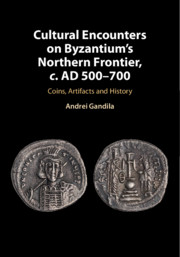Book contents
- Cultural Encounters on Byzantium’s Northern Frontier, c. AD 500–700
- Cultural Encounters on Byzantium’s Northern Frontier, c. AD 500–700
- Copyright page
- Dedication
- Contents
- Acknowledgments
- Abbreviations
- Figures
- Illustration Credits
- Introduction
- 1 The Roman Frontier in Late Antiquity
- 2 Cultural Diversity in the Danube Region and Beyond: An Archaeological Perspective
- 3 Christianity North of the Danube
- 4 Contact and Separation on the Danube Frontier
- 5 The Flow of Byzantine Coins Beyond the Frontier
- 6 Putting the Danube into Perspective: Money, Bullion, and Prestige in Avaria and Transcaucasia
- 7 Money and Barbarians: Same Coins, Different Functions
- Conclusions
- Bibliography
- Index
1 - The Roman Frontier in Late Antiquity
Published online by Cambridge University Press: 08 October 2018
- Cultural Encounters on Byzantium’s Northern Frontier, c. AD 500–700
- Cultural Encounters on Byzantium’s Northern Frontier, c. AD 500–700
- Copyright page
- Dedication
- Contents
- Acknowledgments
- Abbreviations
- Figures
- Illustration Credits
- Introduction
- 1 The Roman Frontier in Late Antiquity
- 2 Cultural Diversity in the Danube Region and Beyond: An Archaeological Perspective
- 3 Christianity North of the Danube
- 4 Contact and Separation on the Danube Frontier
- 5 The Flow of Byzantine Coins Beyond the Frontier
- 6 Putting the Danube into Perspective: Money, Bullion, and Prestige in Avaria and Transcaucasia
- 7 Money and Barbarians: Same Coins, Different Functions
- Conclusions
- Bibliography
- Index
Summary
- Type
- Chapter
- Information
- Cultural Encounters on Byzantium's Northern Frontier, c. AD 500–700Coins, Artifacts and History, pp. 10 - 32Publisher: Cambridge University PressPrint publication year: 2018



